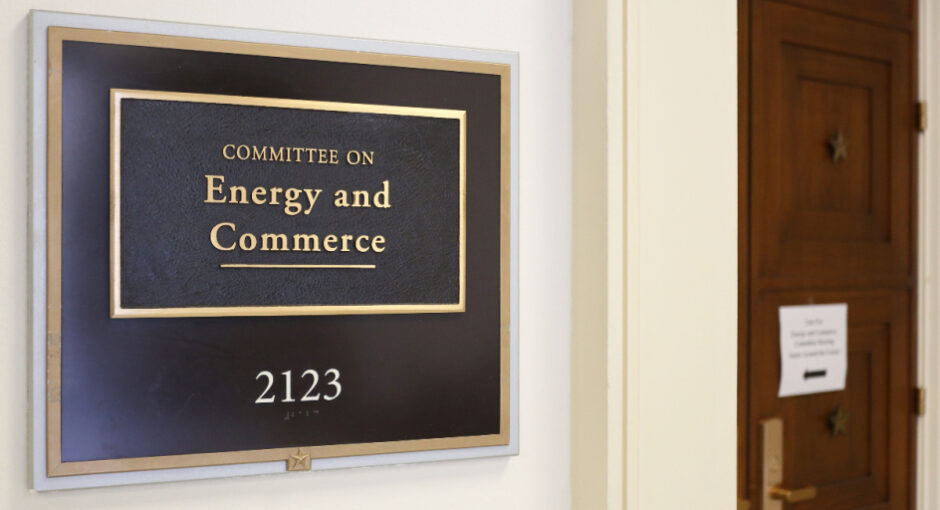340B provider groups won some concessions on controversial Medicaid managed care drug billing language that the full U.S. House Energy & Commerce Committee is marking up tomorrow, lobbyists say. Efforts to get more changes continue.
The committee announced late last night that tomorrow it will markup a bipartisan bill with language that, in its original form, would have made it impossible nationally for 340B providers to earn revenue from billing state Medicaid managed care contractors above what they pay for 340B-acquired drugs.
It is one of 19 healthcare, telecommunications, and energy bills on the committee’s agenda.
The committee tomorrow also is marking up Rep. Larry Bucshon’s (R-Ind.) 340B program transparency bill, H.R. 3290, that would require 340B disproportionate share hospitals to report data about patients who get 340B drugs, spending on charity care, public-payer reimbursement shortfalls, 340B savings, and how those savings are used.
Late this morning, the House clerk released the text of amendments that will be offered to both bills.
Rodgers and Pallone’s bill
The bill with the Medicaid managed care drug billing language, H.R. 3561, is co-sponsored by E&C Committee Chair Cathy McMorris Rodgers of Washington state and ranking Democrat Frank Pallone of New Jersey. The E&C health subcommittee voted 27-0 last week to pass it.
The bill number has changed, from H.R. 3281 to H.R. 3561. So has its title: from the Transparent PRICE Act to the PATIENT Act.
The Medicaid drug billing language was added to H.R. 3281 on the eve of the subcommittee’s May 17 hearing. It said state contracts with Medicaid managed care organizations or their pharmacy benefit managers shall limit drug payment to ingredient cost plus a dispensing fee not less than what the state pays in Medicaid fee for service.
In most states, 340B providers can bill Medicaid MCOs at above acquisition cost and use the money they make to treat more patients and improve services. There are huge ongoing fights in California and New York over those state’s actions to make 340B providers bill Medicaid MCOs at acquisition cost for 340B drugs.
340B provider groups did not expect such language to be added to Rodgers and Pallone’s bill. They got similar language removed from prior House and Senate bills. Its resurrection set off a scramble to get it removed or modified.
An amendment Rodgers will offer to H.R. 3561 tomorrow says states “may” let Medicaid MCOs or PBMs pay above acquisition cost for 340B drugs, applicable to all 340B covered entity types, according to a person involved in the negotiations about the new language. Such payment may not exceed what the MCO or PBM would have paid “had such drug not been furnished by such a covered entity.” Also, covered entities that get above-acquisition-cost reimbursement will have to report annually to the Secretary of Health and Human Services “the aggregate amount” of payments above acquisition costs.
340B provider representatives says if this language eventually becomes law, it will be the first time that covered entities will have to report their 340B savings to the federal government.
340B provider representatives also say they have questions about the phrase “furnished by such a covered entity” in the amendment. They worry that it may be interpreted to preclude payment above acquisition cost for 340B drugs when contract pharmacies dispense such drugs.
Bucshon’s bill gets tougher
The House clerk this morning also released the text of an amendment Bucshon will offer to his 340B transparency bill, H.R. 3290. The biggest change appears to be that noncompliance would be punishable by civil monetary penalties.
H.R. 3290, the 340B Transparency Act (the title is another change), would require 340B disproportionate share hospitals “and any other covered entity” that the U.S. Secretary of Health and Human Services specifies to report annually for each covered entity and off-campus outpatient department data including:
- number and percentage of patients who received 340B drugs, broken down by Medicare eligibility, Medicaid enrollment, and no insurance
- total charity care costs
- total costs of serving Medicare, Medicaid, and uninsured patients minus total payments for such services
- 340B savings and how they were used.
HHS would have to publish the data it collects annually in a searchable form on 340B OPAIS, the 340B program database, “in a manner that shows each category of data reported in the aggregate and identified by the specific covered entity submitting such data.”
In a third change to the bill, HHS now also would have to publish on 340B OPAIS each hospital’s Medicare disproportionate patient percentage “for each cost reporting period occurring during” each reporting year.
HHS would have 180 days after the enactment date to issue an interim final rule to carry out all these new requirements.
H.R. 3290 also would let HHS audit covered entity records to determine how entities use their savings from 340B drug purchases. Entities would have to keep and provide records as HHS deemed necessary. HHS has been seeking this authority for several years. The bill defines savings from 340B drugs as the difference between either GPO or wholesale cost for a drug and the drug’s 340B ceiling price.
The E&C health subcommittee voted 16-12 on May 17 to pass H.R. 3290, all yes votes Republican and all no votes Democratic.


